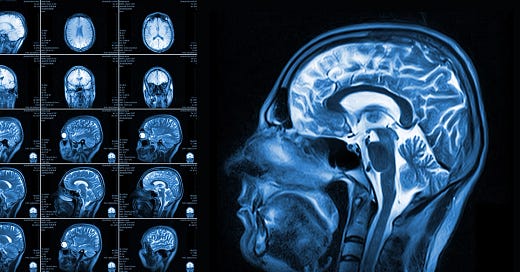Hi 👋 friends,
💡 One Insight
This is an educational edition, not so much a reflective one. I like using physical health analogies when helping people understand mental health concepts. I say that with a caveat that I dislike the separation of the two as if mental disorders aren’t physical but let’s not get side tracked in the oh so boring brain vs mind debate (sorry not sorry psychotherapists who seem to love this question).
In my last therapy session we talked about the wounds we carry with us when considering grief, burnout and other forms of psychic pain, which the led to a discussion about how some wounds need a bit more than just a plaster (or band aid off of American… Band aid to a Brit refers to a terrible charity single from Live Aid in the 1980s with questionable lyrics and Bono at his most insufferable… anyway enough avoidance from me).
Some common tropes in psychiatry is that mental disorders are somehow less treatable than chronic diseases of other organ systems. It’s simply not true, and many Doctors still underestimate the morbidity and mortality of conditions like COPD, congestive heart failure and chronic kidney disease, many of which have worse prognoses than a lot of cancers.
Many also question why someone might be on 2, 3 or even 4 psychotropic medications, or why they may have 2 or 3 diagnoses like depression, generalised anxiety disorder and substance use disorders. To that, I use the analogy of how high cholesterol, high blood pressure and diabetes are often seen together – separate diagnoses with separate treatments, stemming from shared risk factors and where the disease processes can impact each other. To me, it’s no different, and I stand by these analogies as a way of trying to work towards parity of esteem between mental disorders and the rest of medicine.
Who am I?
Hi 👋 friends, thank you so much for subscribing to my newsletter. I’m Elliott, a doctor and psychiatrist in the UK I make content about how to use an understanding of mental health 🧠. I hope that you will find this helpful in knowing how to use your mind as a tool of strength.
🧠 One Strategy
Knowledge Is Power - When It's Shared Accessibly
This is for my fellow healthcare professionals. One of the reasons I’m on YouTube is to make mental health education that is accessible by the people who really need it. Analogies are a helpful way to improve psychoeducation.
🔁 One Shift
The constant need to justify mental health by comparing it to physical health is understandable—but also exhausting. Mental disorders are brain diseases. To suggest otherwise just perpetuates fringe beliefs that mental illness is less than or less legitimate or worse still, just a reaction to stress.
📌 One Resource
This is a boring resource recommendation but hopefully a helpful one.
This website is both free and excellent when it comes to accurate education about almost any illness:
No, I’m not recommending The Body Keeps the Score…
📣 One Question for You
What ways of healthcare professionals helped you to understand your diagnosis? What worked well, and what worked disastrously?
Let’s Connect
▶️ YouTube: / drelliottcarthy
📸 Instagram: / dr.elliott.carthy
🎥 TikTok: / drelliottcarthy
👨💻 Linkedin: / elliottcarthy
🌍 My website: https://www.drelliottcarthy.com
Before you go…
I’d love to know if any of this resonated with you. Leave a comment if you’re comfortable sharing x
Do check out my reaction video on: Doctor Reacts to The Pitt Finale – the most accurate medical drama on TV.





In the United States context, there seems to be a reticence on the part of healthcare professionals to even discuss diagnoses for mental health conditions with patients/clients. I think it is worth asking what the interpretive role a diagnosis could and should have in a patient's/client's mental health journey. As you are aware, Elliott, there is much diversity in how a diagnosis enters a patient's/client's interpretive schema. This interpretive diversity is also the case with physical health conditions. Thus, I argue, that healthcare professionals need to discuss with patients/clients not only what their diagnosis is but also how the patient/client is coming to understand the significance of a diagnosis in their own lifeworld.
I have a few things going on at once and strange life circumstances, so it gets hard to know what comes from what, and doctors all point at each other. If I go check my fibromyalgia, they say it's my thyroid, I go check my thyroid, they say it's my narcolepsy, I go check my narcolepsy, they say it´s my depression... and so forth. That and the fact that my therapist thinks every symptom is about my mental health, but doesn't like labels, so won't diagnose me, kinda drove me mad to the point I gave up trying to figure things out and just go with survival strategies...